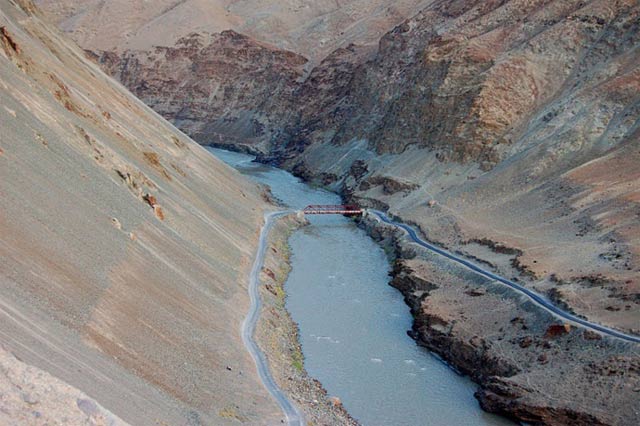
New Delhi has avowed plans to build ‘several dams’ on the rivers flowing into Pakistan while Prime Minister Narendra Modi has threatened to ‘run Pakistan dry’. However, Islamabad warned on Friday that it would use all options available to safeguard its water rights in case Delhi revoked the Indus Waters Treaty (IWT).
Pakistan hopes WB aware of its role as guarantor of Indus Waters Treaty
The Indus Waters Treaty was brokered by the World Bank between Pakistan and India in 1960. The treaty has survived three wars and hostilities between the two countries. Pakistan urged the World Bank to ensure implementation of IWT to resolve water disputes.
The demand and warning were made in a joint session of the parliamentary committees on foreign affairs and water and power which unanimously demanded that the World Bank constitute the court of arbitration without any delay to adjudicate the issues raised by Pakistan on the construction of Kishanganga and Ratle hydropower projects by India.

The meeting was convened to discuss the water issues with India, particularly after the World Bank temporarily stopped playing the role of an arbitrator last month. The move was seen as advocating the Indian stance that seeks resolution of water disputes through bilateral talks instead of third-party mediation.
Through a resolution, the parliamentary panels demanded that until the formation of the court for arbitration, the World Bank must urge upon India to immediately halt the construction of Ratle dam.
Water and Power Secretary Younis Dagha said Pakistan would move the international court of arbitration against India on the construction of Kishanganga and Ratle dams. Pakistan has taken up the matter of Indian water aggression with the World Bank, he added. Pakistan would build the Diamer Basha dam from its own resources and funds would be allocated in next year’s Public Sector Development Programme (PSDP).
Foreign Secretary Aizaz Ahmad Chaudhry said Pakistan reserved the right to use all options if India reneged on the IWT. Premier Modi was playing political and strategic cards on the IWT.
“Water is a common issue for all of us, he said. “The World Bank is the first option for Pakistan to resolve water issues with India.” He said Pakistan wanted the World Bank appointed an independent neutral expert and chairman of international court of arbitration.
World Bank declares pause to protect Indus Waters Treaty
Aizaz said Pakistan would not allow India to revoke or violate the ICT. The World Bank should play its role in implementing the treaty. “This treaty should be implemented as it is a matter of life and death for Pakistan.
“We will safeguard our interest at any cost,” he said, adding that New Delhi was using delaying tactics while Pakistan wanted an immediate solution. According to him, India is planning to build 45 to 61 dams which is a big concern for Pakistan. “The World Bank should bind India to stop building these dams.”
Legal expert Ahmer Bilal Soofi shed light on overall water disputes among the states in different parts of the world, and particularly on the IWT with different legal dimensions and available options and recommendations for Pakistan.
He said the IWT could not be revoked unilaterally as it would be an illegal act. Premier Modi’s warning to run Pakistan dry threatened the lives of millions of Pakistanis and jeopardised regional peace, he said.
“Minimum flow of water in rivers is a part of the international law,” he said and suggested that the Pakistan government write letters to the United Nations and the World Bank against India’s water aggression. He called on all political parties to set aside their petty differences and unite on the water issue as it is matter of Pakistan’s interests.
PTI lawmaker Dr Shireen Mazari questioned the legality of the joint session of two parliamentary committees, saying that under which law the sitting had been convened.
PTI’s Vice Chairman Shah Mehmood Qureshi said the water issue between Pakistan and India was so important that it would dwarf the Kashmir dispute. “The government should formulate a strategy on the IWT and we will support it,” he added.
PkMAP chief Mehmood Khan Achakzai said Pakistan should look inwards for its current defensive position on water disputes with India. “We have made mistakes in the Indus Waters Treaty,” he added.
Published in The Express Tribune, January 21st, 2017.

1721377568-0/BeFunky-collage-(18)1721377568-0-165x106.webp)




1732617223-0/Untitled-design-(69)1732617223-0-270x192.webp)

1732603037-0/BeFunk_§_]__-(51)1732603037-0.jpg)
1732610150-0/Untitled-design-(3)1732610150-0-270x192.webp)







COMMENTS (5)
Comments are moderated and generally will be posted if they are on-topic and not abusive.
For more information, please see our Comments FAQ